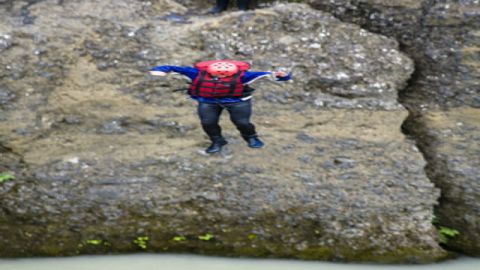Isabella’s Jump, Control, and the Egyptian Revolution

Control. Without a sense of control, we feel less safe. With a sense of control – whether we actually have that control or not – we feel safer. A couple current examples demonstrate this psychological truth; one in the streets of Cairo, one on a glacial river in Iceland.
The Egyptians who in 2011 forced Hosni Mubarak from his autocratic power over their lives were fighting for control. Then, after it felt to many Egyptians like the Muslim Brotherhood had taken control by writing a constitution that gave them inordinate power, a fresh wave of protests forced the Brotherhood’s representative, Mohammed Morsi, from the Egyptian Presidency. At its heart, this really is about control, the desire of Egyptians, like people anywhere, to feel that their lives are not being controlled by others.
It goes by many names, this desire; Freedom. Democracy. Independence. But these are just the semantic rallying cries of revolutions through history, synonyms for Control. People want to control their own lives, their own futures. With a sense that they have some control over how their lives are going, populations are more comfortable, less afraid, and more willing to accept the forces that actually have quite a bit of control over their lives; big government, big business. But the more that people lose that sense of control, they more they push back against those forces. The Tea Party protests Big Government. The Occupy Movement protests against the wealthy One Percent. But both say they are fighting for the same thing…more control over their own lives.
The impact of feeling in control played out recently on a glacial river in northern Iceland. I was whitewater rafting with my wife and a small group of strangers. Nothing too hairy. Class 2. Entry level, really, except for the dry suits, a reminder that glacial rivers are dangerously cold. An hour into the trip down a magnificent narrow canyon between high walls of volcanic rock, our guide put us ashore at a spot where we could climb up a ledge maybe 20 feet above the rushing river below…and jump off down into the rushing river. “Who wants to try?” Dan gently asked.
Tomas, the Danish professional handball coach, was all for it. At first he was the only one. His girlfriend Isabella hesitated and then volunteered. Your very own risk perception blogger had to give it a try as well, of course. Before I was out of the raft Tomas was up the rock and flying out into the river, his flotation vest bobbing him right back up to the surface. He frantically swam out of the current back to the boat. Isabella was next. But high on the rock looking down, her cheeks flushed. Her eyes turned into saucers. Her voice rose. All the clinical signs of Fight or Flight of Freeze “I’m FREAKING OUT” stress were there. “I can’t do it!” she said, shaking her head and starting to climb back down.
It was time to see if this Control thing was for real. Earlier in the trip the six of us in the boat had shared stories of what we did professionally, and I had mentioned my work as a consultant in risk communication. “Isabella,” I offered. “Try this. Move to the edge slowly, but don’t look down. That way your animal brain won’t have the signal that you are in danger. Your thinking brain will know, of course, but your animal instinctive brain won’t, and it may help you feel safer. It may help you jump, if you want to try.”
She nodded and thanked me but stood back to let me go. With a mix of fear and excitement I jumped, foolishly fearing more the icy blast of water that might fill my dry suit, than drowning. Kind of a problem with my own risk perception, eh? The jump was short. I stayed dry. The current wasn’t bad. I swam back to the boat.
As I flopped back into the rubber raft, Isabella stepped to the lip of the ledge, and jumped! She popped right back up, grinning about as broadly as one can. As she got back in the boat, beaming, she said “Thank you! For helping me do that. What you told me…it gave me a feeling that I was in control…and I wasn’t so afraid.” No adviser in risk communication could have been any more proud.
Funny thing is, I have no idea whether not looking down actually helps. When I got to the edge I tried it…looking down and then up away from the 20 feet I was about to plummet…and it didn’t ease my fears. But I was pretty sure giving Isabella a sense of control might help. And it did. And she was thrilled. And so was I, having helped her experience this special adventure, and discover her own courage.
This is what risk really is; not the facts, but how those facts feel. Isabella’s rational brain knew the risk of the jump was tiny. There was her dry suit, her thick flotation vest, even a safety kayaker just down river to fish us out if we couldn’t swim free of the current. But the situation sure felt scary. And those feelings mattered more. A feeling of control changed the whole dynamic, however, and made Isabella more comfortable, less afraid.
Egyptians know that ‘democracy’ will not end the severe hardships of their daily lives, difficult challenges to their health and well-being and personal futures. But a feeling of at least some control over those futures will probably make them seem a little brighter. If the Egyptian Army, and interim President Mohammed El Baredei, can give Egyptians that sense of control, the prospects for one of the oldest nations on Earth are likely to improve.
Isabella’s jump has lessons for all of us.





